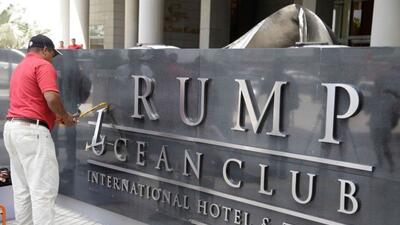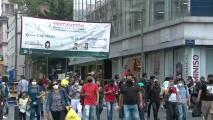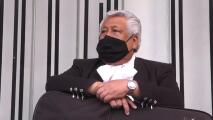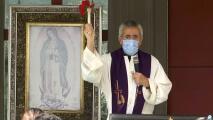How Trump’s 'Art of the Deal' came untied in Panama

When Donald Trump cut the ribbon in Panama on his first luxury hotel project in Latin America in 2011 he seemed to have the country eating out of the palm of his hand.
Panama's president Ricardo Martinelli hailed Trump: "Everything he has done in his life turns to gold," he said.
That's no longer the case in Panama. Infinitely more powerful today than he was then, President Trump's star has waned and this week the small, traditionally pro-U.S. nation rudely rebuffed his hotel brand.
On Monday, the Trump name was pried off a sign outside the five-star hotel with a crowbar after a judge evicted Trump's hotel management company. This week housekeepers removed all Trump-brand room items; from notepaper, to the leather-bound hotel guide, bathrobes and bottles of mouthwash.
The story of how the author of the 'Art of the Deal' lost control of the prized hotel offers some humbling lessons for the Trump Organization. According to interviews and court documents, the Trump family business appears to have been outsmarted by a largely unknown but well-connected group of real estate investors, some of whom voted for Trump in 2016 and donated money to his campaign.
Trump's anti-Hispanic rhetoric on the campaign trail and since becoming president may also have hurt his brand in Panama.
The hotel takeover was led by a Miami-based private equity fund, Ithaca Capital Partners, founded by an Oxford University-educated lawyer, Orestes Fintiklis, backed by one of Panama's top lawfirms and some of the country's most influential ‘rabi-blanco’ (white tail) families, the nickname used to describe the country's mostly white business elite.
By contrast, the Trump Organization relied mostly on its New York lawyers, as well as a largely unknown law firm in Panama, and a handful of muscle-clad security guards, who now face charges in Panama from trespassing to physical assault and document shredding.
“ The Trumps underestimated who they were dealing with here. This Fintiklis guy ran rings around them,” said Fernando Nunez Fabrega, a former foreign minister and radio station owner.
To be sure, the battle is not over, and the fate of the hotel’s management could still be decided by an ongoing – and already bitter – arbitration process with the ICC (International Chamber of Commerce) between the Trump Organization and Ithaca Capital, which owns 200 of the hotel’s 369 condo units.
But Trump's case seems to be losing steam.
Fintiklis has sued Trump Hotels for $15 million, alleging “abysmal management.” Trump Hotels hit back accusing Fintiklis of breach of contract.
The Trumps originally countersued for $50 million, with treble punitive damages, totalling $150 million. However, a court filing on Friday showed Trump Hotels slashed its damage claim to only $3 million, with treble damages totalling $9 million. (Under ICC rules damage claims require a deposit).
Homework
Since buying into the hotel last year Fintiklis appears to have done his homework. On the advice of friends, he hired Morgan & Morgan, a 90-year-old Panamanian law firm widely regarded as the most influential in the country with a dozen offices in Latin America, Europe and Asia.
By contrast, Trump Hotels was represented by Britton & Iglesias, a little known, lower tier firm.
Ithaca picked up the 200 units – as well as the hotel's three restaurants and a large conference center – at a bargain basement sale last year for $25 million after Trump’s original partners in the hotel and condo project went bankrupt. Trump’s due diligence failed to detect serious legal issues with his original partners, Newland International Properties, whose investors included several South American businessmen accused of money laundering, fraud and drug trafficking.
After the August closing, Fintiklis issued a statement calling the hotel “an iconic property,” adding that he looked forward to working with the Trumps.
Despite being one of Panama's most striking buildings, the product of German engineering, under Trump management the occupancy – and revenue for condo owners – fell, according to financial documents. Ithaca, and the other owners say repeated efforts to work with the Trump’s team to improve its financial performance were to no avail, according to court documents.
Trump's arbitration claim denies any wrongdoing and accuses Fintiklis of “sheer fraud and deceit,” alleging he deliberately misled the Trumps about his intentions and conspired with other owners to stage a “lawless coup.”
Some of Ithaca's U.S. investors are die-hard Trump supporters, according to one who spoke to Univision on condition of anonymity. Some of them voted for Trump, and donated to his campaign. (Fintiklis could not vote for Trump as he is not a U.S. citizen.)
'The Gordian knot'
After efforts at cooperation broke down, Fintiklis methodically set about figuring out how to remove the Trump brand from the hotel, comparing the legal challenge to untying a Gordian knot in Greek legend. Trump’s hotel management contract was not set to expire until 2031, and the 1,100-unit development had a complicated legal structure involving the licensing of the Trump brand, as well as two separate management contracts awarded to the Trump Organization for the 650 condo units and 369 hotel units.
To figure out a legal strategy, Fintiklis hired Joshua Bernstein a New York real estate litigator with the firm Akerman, and Tara Gorman, a law professor at American University and expert on brand standards in hotel management agreements. Gorman was intimately familiar with the Trump project as she helped draw up the legal structure years earlier while at Greenberg Traurig, Miami’s largest law firm.
In 2013, Bernstein had won a landmark mismanagement case against Marriott in a dispute over the running of the Eden Roc hotel on Miami Beach. The judge’s ruling established the precedent that hotel owners had "unfettered discretion in managing the hotel's operations."
Univision comfirmed the participation of Bernstein and Gorman, but both declined to comment.
Curiously, Trump hired Bernstein’s former partner, Todd Soloway, at another New York law firm, Pryor Cashman, to represent him in the arbitration. Soloway worked with Bernstein on the Eden Roc case, in which they represented the owners. But his role is now reversed in Panama, with Soloway representing the managers. When contacted by Univison he declined to discuss the precedent set in the Eden Roc case.
History lesson
In Panama, Trump appears to have few fans.
In fact, he was briefly declared persona non-grata by Panama City’s municipal council in 2011 after telling CNN that after building the Panama Canal the U.S. "foolishly" gave it back "for nothing." (The United States built the canal early last century and in 1977 former President Jimmy Carter signed the Panama Canal Treaty with Panama's strongman Gen. Omar Torrijos, which gave control of the canal back to Panama in 2000.)
Panama
His words were the source of some amusement again last year during a White House meeting with Panama’s President Juan Carlos Varela, during which Trump congratulated the U.S. for doing a "good job building it (the canal)."
Varela quickly pointed out that was: "One hundred years ago."
Trump went on: "We did a very good job. But things are going well in Panama. The relationship has been very strong. We are developing new things to do and only getting stronger."
Not so, say the condo owners at the (former) Trump property. The president's language about Hispanics and Africans "has greatly harmed the reputation and value" of their units, according to a legal complaint by the condo association filed on Wednesday.
Despite being born in Cyprus and educated in England and France, Fintiklis, 39, also has deep roots in Panama. He counts among his friends two of Panama’s wealthiest families, as well as Hugo Torrijos, who runs a shipping business on the Panama Canal and is the great nephew of Gen. Torrijos, Panama’s legendary former military ruler.
The youinger Torrijos’ father headed the Panamanian shipping registry helping transform it into one of the world's largest open registries at the time, according to Seatrade Maritime News. He was also director-general of Panama's National Port Authority.
"We protect our own"
Fintiklis first came to Panama 11 years ago, around the same time that Trump was planning his hotel and condo. At the time Fintiklis was working for another high end real estate private equity firm, Dolphin Capital Partners, to develop a luxury eco-resort, Pearl Island, in the Gulf of Panama. One of the Panamanian partners in that project was Guillermo St Malo Eleta, an executive of the Eleta Group, one of Panama’s most successful and diversified business enterprises, owners of local media, real estate, coffee and agri-businesses.
After Fintiklis left Dolphin to form his own equity fund, they remained friends.
Another ally, Alberto Vallarino, is a former bank owner and Minister of Economy and Finance, whose VerdeAzul Group also has major real estate holdings, including malls and luxury hotels.
"You put those names together and that's quite a lineup," said Bobby Eisenmann, a respected newspaper owner and real estate developer who was forced into exile during the military dictatorship of General Manuel Noriega.
Several Panamanians interviewed by Univision were surprised by Trump's tactics. "If you are going to do business in Panama you better have it mapped out first," said one Panamanian-American business executive for a top local conglomerate. "We may fight amongst ourselves but we tend to be tight, because there's not many of us and we are all related. We protect our own," she added.
On the other hand, some Panamanians suggested Trump maybe didn’t care very much about the management contract.
Indeed, Trump's profits were way down and the management contract brought in only $200,000 last year, according to financial records viewed by Univision.
Nonetheless, over the last seven years Trump did well for himself in Panama. Trump Hotels is estimated to have earned $45 million from its licensing and management deal.
"Isn’t that Trump's business strategy; make a fast buck and get in and out?" said Panamanian law professor and politician Miguel Antonio Bernal, 68. "Maybe he got what he wanted out of the hotel."
He said Trump did nothing different from what many have done before. "Panama is not a country, it’s a business," he said, echoing a line in John Le carre's spy novel 'The Tailer of Panama.'
"In Panama, money talks," he said. "We wash it, iron it and starch it."
"An experience like no other"
The Trump Organization has by no means accepted defeat.
In a statement this week Trump Hotels recognized that it no longer was running the hotel, but insisted that the legal status of its management agreement remained intact. "Trump Hotels remains fully confident that it will not only prevail, but recover all of its damages, costs and attorneys’ fees," it stated on Monday.
It was still advertising the Panama hotel on its website, offering "an experience like no other." However, the website was not accepting reservations.
That's because it no longer controlled the hotel bank account, hotel staff told Univision. In fact, when Trump's staff were evicted on Monday they allegedly removed the IT system.
The owners have since appointed a new general manager and installed new computer equipment.
On Thursday the hotel got a new name: The Bahia Grand Panama. It is accepting reservations. Its website announces "one exciting change–we’re under new management."





